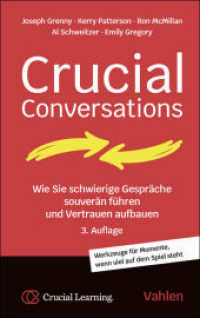- ホーム
- > 洋書
- > ドイツ書
- > Humanities, Arts & Music
- > Arts
- > theatre, ballett, film
Full Description
«Given that most scholarship on cinema and utopia focuses on the subgenre of dystopia and its pessimistic discourses, Mónica Martín's volume could not be more timely. It is a pioneering work; arguably the first book in English devoted to systematically analysing the utopian impulse as a textual feature in contemporary Anglophone cinema. Discussing a wide range of films, from mainstream blockbusters to independent, low-budget productions, this is a fascinating comparative study on the potential for cinema to engage with the phenomenon of social dreaming and the search for a better society. This is not only a theoretical intervention, but a political one.»
(Mariano Paz, University of Limerick)
Thinking across the boundaries of utopian studies, film studies, and the sociology of globalisation, this book argues that 21st-century cinema illustrates the rebirth of utopia as an open method grounded in cosmopolitan worldviews and aspirations. Rather than negating hope, promoting a fixed agenda, or depicting an exemplary status quo, contemporary movies such as Children of Men, The East, and The Hunger Games series articulate a cosmopolitan utopianism that vindicates egalitarian and sustainable futures. Re-inscribing the utopian within the political, many 21st-century films challenge existing geopolitical borders and the social barriers imposed by class, gender, race, sexuality, and birthplace. Ecocritical film spaces, caring protagonists, non-mainstream survivors, ecofeminist leaders, and cooperative networks prompt spectators to develop integrating dialogical imaginaries that contest patriarchal traditions, ecocidal progress, and neoliberal definitions of the global. Contemporary with climate change, economic recession, and global social movements, the films explored in this book re-stage utopia as a cosmopolitan method of critical resistance and transformative action—a process in the making that evokes a fairer world to be as much as it speaks of a world that is: one in which global interdependence has shaped not only risks, hostilities, and inequalities, but also inclusive horizons, holistic thinking, intersectional activism, and nurturing affects for others that have become part of us.
Contents
Contents: Re- staging Utopia: From Blueprint to Method - Utopia in the Movies: Connecting Film and Utopian Analysis - From Risk Society to Cosmopolitanism: Visions of Globalisation and Its Spaces - Economic, Environmental, Social - The Spatial Politics of the End: Apartheid Solutions and Eco- Cosmopolitan Visions in Post- apocalyptic Films - Children of Men: Utopia as a Cosmopolitan Method - Changing Modes of Being in the World and Thinking of Our Place in It: Global Alternatives to Neoliberal Philosophy - Non- mainstream Film Survivors: Emancipatory Resistance beyond the Boundaries of the Normative - The East: Awakening to Eco- Social Dreaming - A Cosmopolitan Ecosystem of Political Dissent: Global Social Movements - The Politics of the Multiple: Cooperative Networks United in Diversity - Time's Up: Katniss Everdeen's Ecofeminist Leadership in The Hunger Games Film Series.








